Pope Francis


The German churchman christened the “Bishop of Bling” by the media for lavish expenditures he made on his residence and church offices has quietly been given a low-level post at the Vatican, nearly a year after Pope Francis ousted him from the Limburg diocese.
Bishop Franz-Peter Tebartz-van Elst may already be in Rome, according to church sources and media reports, and next month will begin work as a “delegate” at the Pontifical Council for Promoting the New Evangelization, an office in the Roman Curia.
While the Vatican has so far declined to comment, Tebartz-van Elst will reportedly help prepare catechetical materials – his area of expertise – for various national bishops conferences. But he won’t have his name attached to any documents, according to Archbishop Rino Fisichella, head of the council.
The post was created for Tebartz-van Elst and has the hallmarks of a “make-work” job because the Vatican couldn’t figure out what else to do with the prelate.
Controversy over Tebartz-van Elst’s outlays in Limburg erupted in October 2013 when it was revealed that costs to renovate the diocesan center and the bishops’ home ran several times over the initial estimate, to some $40 million.

If you are a Christian, protecting the environment is part of your identity, not an ideological option, Pope Francis said Feb. 9.
“When we hear that people have meetings about how to preserve creation, we can say: ‘No, they are the greens!’” Francis said in his homily at morning Mass, using a common name for environmental activists.
“No, they are not the greens! This is the Christian!” he said.
“A Christian who does not protect creation, who does not let it grow, is a Christian who does not care about the work of God; that work that was born from the love of God for us,” Francis continued. “And this is the first response to the first creation: protect creation, make it grow.”
The pope — who took his name from St. Francis of Assisi, the patron saint of the environment — has made care for the environment a hallmark of his papacy since he was elected nearly two years ago.

A papal commission on clergy sex abuse is close to giving Pope Francis recommendations on how to punish bishops who shield priests suspected of misconduct, one of several moves announced Feb. 7 that are encouraging the two victims on the panel.
But the two victims also said the Vatican has a year or two at most to implement policies with teeth, otherwise they will leave.
Peter Saunders of Great Britain, who was sexually assaulted as a boy by priests at his Catholic school, told a crowded news conference at the Vatican press office that he came to the meeting “with a fair degree of trepidation” that anything significant would result.
But after the initial two days with what he called a “group of quite remarkable and determined people,” including Boston Cardinal Sean O’Malley, head of the commission, he said “the trepidation has kind of disappeared.”
“I’m actually very, very hopeful that there are going to be some very significant things happening,” especially on disciplining bishops, said Saunders, who heads the London-based National Association for People Abused in Childhood.
But he warned that “if in a year or two there isn’t some firm action on those matters then I don’t think I’ll be sitting here talking to you.”
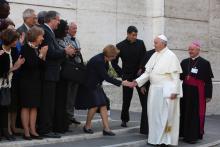
Whether women can, or should, “have it all” — both work and family — has been one of the most contentious cultural debates of the modern age and one any secular or religious figure engages at his or her peril.
But Pope Francis is nothing if not intrepid, and on Feb. 7 he plunged in by arguing that the Catholic Church should help “guarantee the freedom of choice” for women to take up leading posts in the church and in public life while also maintaining their “irreplaceable role” as mothers at home.
In his remarks to the Vatican’s Council for Culture, which has been holding meetings on the role of women in modern life, Francis sought to carve out a “new paradigm” in the gender wars.
He said Western societies have left behind the old model of the “subordination” of women to men, though he said the “negative effects” of that tradition continue.
At the same time, he said, the world has moved beyond a model of “pure and simple parity, applied mechanically, of absolute equivalence” between men and women.
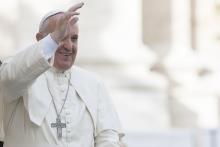
The Francis Revolution is crossing the Atlantic and coming to the heart of the nation’s Capitol. News broke yesterday that Pope Francis has accepted Speaker John Boehner’s invitation to address a rare joint session of Congress during his upcoming trip to the United States on Sept. 24.
This is the first time that a pope has addressed Congress and provides a world-class opportunity for the Holy Father to lift up the Gospel’s social justice message to the most powerful legislative body in the world.
So what will the Jesuit from Argentina talk about? Studying his nearly two-year tenure as the Bishop of Rome suggests that Pope Francis will focus particularly on the scandal of inequality and exclusion.
Last April, Pope Francis tweeted that “inequality is the root of all social evil.” The seven-word tweet caused an uproar in American media, but the truth is that Francis had been saying the same thing for years. In his 2013 letter Joy of the Gospel, Francis wrote “just as the commandment ‘Thou shalt not kill’ sets a clear limit in order to safeguard the value of human life, today we also have to say ‘thou shalt not’ to an economy of exclusion and inequality. Such an economy kills.”
With reports last fall suggesting that economic inequality in the United States is at its highest levels since the Great Depression, Pope Francis will likely call on our elected leaders to transform our economy into one where no one is left behind.
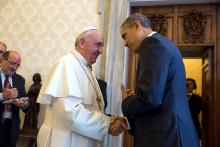
Pope Francis will make an unprecedented address to Congress on Sept. 24 during his first visit to the United States.
House Speaker John Boehner announced Feb. 5 that the pontiff accepted the invitation Boehner extended last year.
“In a time of global upheaval, the Holy Father’s message of compassion and human dignity has moved people of all faiths and backgrounds,” Boehner said in a statement. “His teachings, prayers, and very example bring us back to the blessings of simple things and our obligations to one another.”
No pope or religious leader who serves as a head of state has ever addressed Congress, according to the U.S. House Historian’s Office.
In a brief statement, the Archdiocese of Washington said: “It is a great honor and tremendous joy to welcome our Holy Father, Pope Francis, to the Archdiocese of Washington during his proposed pastoral visit to the United States in September.
LEONARDO BOFF’S Francis of Rome and Francis of Assisi: A New Springtime for the Church offers intriguing portraits of the current bishop of Rome and the saint that is his namesake. The book provides an introduction to these two extraordinary figures and includes a brief overview of the papacy, tracing how the office of the bishop of Rome eventually became the infallible pope.
The Roman Catholic Church depicted through Boff’s eyes is a church in crisis, reeling from the Vatican Bank and clergy sex abuse scandals. The institution and leadership have lost credibility in the eyes of many and the Roman curia is in need of reform. Yet this crisis is tempered by the election of Jorge Mario Bergoglio as pope, which for Boff fuels a tangible optimism for the church’s future.
Both men in these pages are called to the work of reform. Francis of Assisi’s conversion began when he heard a crucifix in a small church say, “Francis, go and restore my house, because it is in ruins.” Boff depicts Pope Francis as receiving a similar call, to reform the church so that it becomes a church that is poor, emphasizing humility and charity. Boff raises both men as models of living with the poor and like the poor, citing the now famous example of Francis going to pay his hotel bill after being elected pope.
IN THE LARGEST currency change that the world has ever seen, the euro was launched on New Year’s Day 2002 with great excitement and ceremony in 12 eurozone member countries. At the time, the shared currency was considered to be a vehicle for tying together separate states and cultures with numerous economic benefits, particularly to trade, employment, and tourism.
Now imagine a humble, 90-year-old Catholic priest, vibrant yet shrunken and bent with age. In Italian, he addresses a group about the euro in the celebratory year of its launch. In one hand he holds up an unconsecrated host; in the other, a one-euro coin. They are the same shape, and nearly the same size. But the coin is shiny silver and gold. The priest speaks simply and directly about how, despite their similar appearance and promise of life enrichment, the euro is deceptive. The dominance of finance and capitalism that it supports is a false idol, he says, which leads to addiction.
This story was recounted by a number of Italian press outlets at the time. It contributes to the mythos of this man who writes extensively about the Eucharist, which he believes, in contrast to the euro, creates a relationship not just with God but with our fellow human beings.
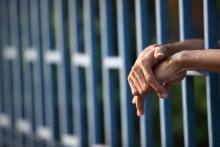
It looks like the death penalty may be on life support.
January was set to be the deadliest month for U.S. executions in 2015, but nine of the 15 executions were stopped. In an unprecedented wave, three of the deadliest states stopped executions planned for last month — Texas, Oklahoma, and Missouri. February has just begun, but nine of its 12 scheduled executions have been halted.
Last year was not a good year for the death penalty, either, as death sentences hit a 40-year low and executions were at a 20-year low.
There were botched executions such as that of Clayton Lockett, who writhed in pain for 43 minutes before dying of a heart attack, with the Oklahoma prison warden calling it “a bloody mess.”
Then there were the exonerations, such as that of Ricky Jackson in Ohio, who spent 39 years in prison for a crime he didn’t commit, convicted solely on the testimony of a 12-year-old boy who recanted.
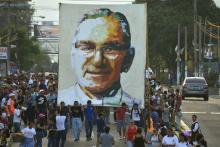
Pope Francis on Feb. 3 officially declared that Archbishop Oscar Romero, assassinated by a right-wing death squad in 1980 while celebrating Mass in El Salvador, was a martyr for the faith, clearing the way for his beatification.
The move ends decades of fierce debate over Romero’s legacy, but it was not a complete surprise: Francis, the first Latin American pope, has often said he thought Romero was a martyr worthy of consideration for sainthood.
But his view contrasts with the conservative papacies of John Paul II and Benedict XVI, which viewed Romero as an icon of the theological left who was killed for political reasons because he spoke out against poverty and human rights abuses.
As a result, Romero’s cause for canonization languished in the Vatican’s bureaucratic limbo despite his great popularity elsewhere.
That is set to change. the Feb. 3 declaration by Francis stated that Romero was “killed in hatred of the faith.” On Feb. 4, the Vatican is scheduled to hold a news conference with Archbishop Vincenzo Paglia, a Vatican official who is promoting Romero’s cause for canonization.
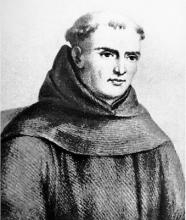
When Pope Francis unexpectedly announced last month that he would canonize the Rev. Junipero Serra during his visit to the U.S. in September, he thrilled the many fans of the legendary 18th-century Spanish Franciscan who spread the Catholic faith across what is now California.
But the pontiff who has decried the “ideological colonization” of the developing world by the secular West is now facing criticism from those who say Serra — called “the Columbus of California” — abused Native Americans and pressured them to convert, aiding in the devastation of the indigenous culture on behalf of the Spanish crown.
“Serra was no saint to us,” Ron Andrade, executive director of the Los Angeles City/County Native American Indian Commission, told the Los Angeles Times.
Some of Serra’s sharpest critics say he was part of an imperial conquest that beat and enslaved Native Americans, raped their women, and destroyed their culture by forcing them to abandon their traditional language, diet, dress and other customs and rites.
Add in the diseases introduced by these Old World invaders, and the original indigenous population of perhaps 300,000 was decimated by as much as 90 percent.
“If (Serra) is elevated to sainthood,” Nicole Lim, the executive director of the California Indian Museum and Cultural Center in Santa Rosa, told The New York Times, “then (Serra) should be held responsible for the brutal and deadly treatment of native people.”

The Vatican will offer homeless people in Rome not only showers but also haircuts and shaves when new facilities open next month, the head of Pope Francis’ charity office said.
The Vatican announced last year that it would provide shower facilities in St Peter’s Square for homeless people.
Bishop Konrad Krajewski told the Italian Catholic newspaper Avvenire on Jan. 29 that it would also offer haircuts and shaves when the services start on Feb. 16 in an area under the colonnade of the square.
Krajewski, whose official title is the pope’s almoner, said barbers and hairdressers would volunteer their services on Mondays, the day their shops are traditionally closed in Italy.

In discussing birth control and population issues when visiting the Philippines recently, Pope Francis said the Catholic Church promoted “responsible parenthood” that didn’t require good Catholics to be “like rabbits.” The frank imagery prompted a flurry of playfully creative headlines that ranged from mocking to woeful. And the byproduct of such reaction stories? The continued misinformation on what Catholics currently practice and what the Catholic Church actually teaches when it comes to family planning.
The pope’s remarks referenced Catholic teaching that prohibits artificial birth control. Family size, according to the Church, should be regulated by abstinence or a form of Natural Family Planning, sometimes characterized simply as trying really hard not to have sex when you’re “not supposed to,” which often fails and results in a ton of kids. Proponents of NFP say the method(s), and its practitioners, are too often misunderstood.
NFP for pregnancy prevention involves charting a woman’s cycles by testing for various biological markers — like basal temperature or cervical mucous — in order to assess fertile days and abstain from sex during that time. According to the World Health Organization, fertility awareness methods like NFP are 95-97 percent effective when used correctly and consistently (75 percent with typical use), and individual NFP models claim higher effectiveness.
Practicing NFP can certainly be complicated, especially when taking into account marriage and family dynamics that aren’t always conducive to the attention it requires.
But while it may be more difficult than, say, popping a daily pill or using an IUD, modern technology — like tracking apps and temperature-monitoting gadgets — is simplifying the process and coinciding with a resurgence in popularity. NFP practitioners say they appreciate the choice it offers — whether the motivation is following Church teaching or simply avoiding synthetic hormones.

There could not be a more important year for climate action. It’s now or never. The future of our planet and the people, places, and things that we love depend on all of us working together to demand a healthy, just, and vibrant planet home. It impacts everything else – immigration and migration due to drought, flooding, sea level rise, and worsening storms; war and conflict over natural resources; access to drinkable water; food insecurity, hunger, and agriculture; disaster relief. It even impacts the sex trade — when women have to walk farther and farther to find water, they’re more vulnerable to rape and kidnapping in many regions.
So here we are, now. Governments, scientists, universities, companies, our military, and thousands of non-profit organizations are all scrambling to save the very integrity of God’s creation, the composition of the atmosphere God so magnificently created to support life on earth. And Christians are barely even at the table. We need to be at the table.

Did you catch the shoutout to Pope Francis during President Obama’s State of the Union address? It’s only the third time in history that’s happened.
Francis’ name will resurface in Congress later this year if and when he accepts an invitation to address lawmakers — that would be a historical first — during his September trip to Philadelphia, Washington, and New York.
“We might say, really, the highlight of the Washington visit might be his speech to the joint meeting of Congress, to the Senate and the House of Representatives,” said Archbishop Bernardito Auza, a member of the papal visit planning committee.
However, such a speech will be far more than a “highlight.” With a Catholic vice president and a Catholic speaker of the House looking on behind him, the speech will serve as a vivid reminder of how far Americans have come in overcoming deeply embedded anti-Catholic prejudice and bigotry.
That bigotry includes Thomas Jefferson, who wrote in 1813: “History, I believe, furnishes no example of a priest-ridden people maintaining a free civil government. … In every country and in every age, the priest has been hostile to liberty.”
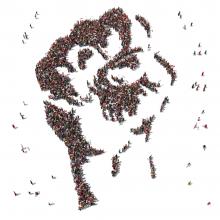
When stories of human trafficking or dramatic rescue operations come across our news feeds, we are understandably shocked. For a moment, our attention is grabbed and we feel genuine outrage toward the traffickers and, hopefully, compassion for the trafficked persons. But to what end?
Sadly, the underground and criminal nature of human trafficking helps to keep the stark realities out of sight and, consequently, out of the minds of most people. When we do think of human trafficking, it tends to be as something that happens “over there” or in seedy brothels. It is somehow easier to blame the bad actors, pimps, traffickers, and sweatshop managers rather than recognize the multiple ways that we are connected to human trafficking through our everyday actions. Because we are, in fact, connected. As Pope Francis observed in his apostolic exhortation, Evangelii Gaudium: “There is greater complicity than we think. The issue [modern slavery] involves everyone!”
Human trafficking is present in virtually every human community. Moreover, because the majority of people held in slavery today are forced to work in agriculture and mining, it is inevitable that products make it into the supply chain and our shopping carts. Sex trafficking also does not happen in a vacuum, but rather in a social context which tolerates, and even normalizes, sexual exploiation and the commodification of the human person.
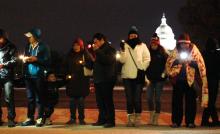
More than 100 Roman Catholic leaders are using this week’s annual march against legal abortion to press anti-abortion House members to pass immigration reform, saying they should see it as another “pro-life” issue.
“As brothers and sisters in faith, we urge these elected officials and all Catholics to defend the sanctity of human lives at all stages. We recognize the image of God in the migrant at the border, in the prisoner on death row, in the pregnant woman and in the hungry child,” the signers say in a letter sent Jan. 21 to two dozen Catholic members of the House of Representatives who are vocal abortion opponents.
The letter, organized by the Washington-based progressive advocacy group Faith in Public Life, is expected to be published as a full-page ad in Politico on Jan. 22.
That’s the day tens of thousands of demonstrators — including some of the House members the statement addresses — are expected to gather in Washington to protest the 1973 Supreme Court decision that legalized abortion, an annual display of passionate anti-abortion sentiment and political muscle.
The statement pointedly cites Pope Francis’ views that immigration woes and economic inequality are threats to life along with abortion, and it appears to be another example of the so-called Francis effect that is recasting the nation’s culture war by shifting the debates onto a broader terrain.


It was a good thing for Trinitas Cellars that Cardinal Jorge Mario Bergoglio took the name Pope Francis, and not, say Pope Malbecius.
When the Argentine cardinal became pope in 2013, Trinitas didn’t have any malbec — the famous Argentine grape — in its cellars. But it happened to have a few barrels of cabernet franc.
Behold! Thus was born “Cabernet FRANCis,” a 2012 red wine from Trinitas, a Catholic-owned winery nestled behind the iconic grape crusher statue at the southern foot of the Napa Valley.
“People kept asking me, ‘Why didn’t you make the pope a malbec?’” said Garrett Busch, the 28-year-old CEO of Trinitas, as he spoke in the winery’s book-lined library tasting room, a bottle of the wine before him. “And I’m like, ‘Come on guys, he made it easy on us.’”
Actually, the story is a bit more complicated. Trinitas, which is owned by Garrett’s parents, Tim and Steph Busch, made the family’s Catholic faith a part of business since its founding in 2002. Meetings and special events begin with prayer, winery dinners start with grace, and the winery’s website announces the family’s intention to “serve God in all they do.”
Even its name is Latin for the Trinity of Father, Son and Holy Ghost.
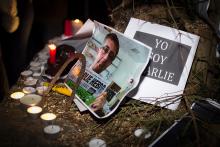
Pope Francis on Jan. 15 condemned last week’s terrorist attack on the French satirical weekly Charlie Hebdo but warned there were limits on freedom of expression.
Speaking to journalists as he flew from Sri Lanka to the Philippines on a weeklong visit to Asia, the pope said freedom of expression was a “fundamental human right” and stressed that killing in the name of God was an unacceptable “aberration.”
“You don’t kill in God’s name,” Francis said.
However the pope, who has made a point of reaching out to Muslims, Jews, and other faiths, said there were limits to self-expression when it involved insulting or ridiculing people’s faith.
“You cannot provoke, you cannot insult the faith of others,” he said. “You cannot make fun of the faith of others.”